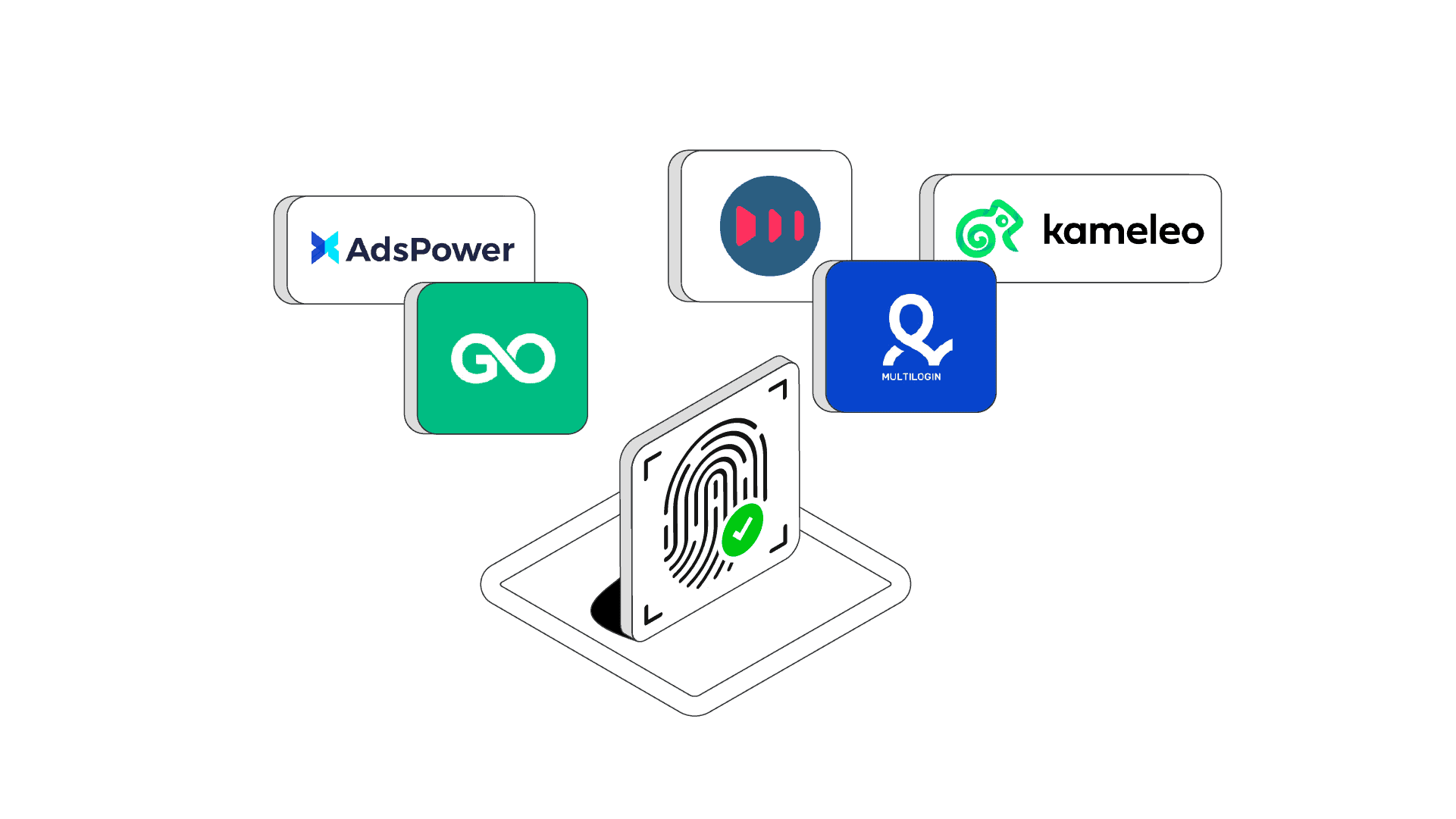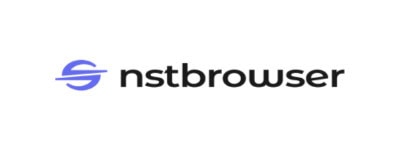The Best Antidetect Browsers for 2026
Whether you’re looking to improve your privacy, or you’re in the business of managing multiple social media, e-commerce, or ad accounts, antidetect browsers can help. However, choosing one is no easy task: many options exist, and they don’t always look trustworthy. We’ve done the research; here are the top picks.

Best Antidetect Browsers for 2026:

1. Multilogin – trusted market veteran.
Use the code PWML50 to get 50% off>

2. GeeLark – antidetect phone for mobile-based apps.
Use the code PROXYWAY to get 20% off>

3. GoLogin – affordable browser with multiple OS support.
Use the code PROXYWAY to get 50% off>

4. AdsPower – powerful no-code automation tool.
Visit AdsPower>

5. Kameleo – unlimited profiles and a mobile app.
Visit Kameleo>
What Are Antidetect Browsers?
An anti detect browser is an app based on popular web browsers, usually Chrome or Firefox. It lets you create separate browsing environments with their own digital fingerprint: different browser headers and other identifying information. As a result, websites can’t link to those environments to one another. Antidetect browsers are often used to manage multiple accounts on social media, control merchant profiles on e-commerce platforms like Amazon, or run Google Adwords.
Learn more: A Guide to Antidetect Browsers.
How to Pick One
If you’ve started researching antidetect browsers, you know they’re not exactly hard to come by. In fact, we can count at least ten. That’s quite a variety! Many of the options differentiate by price and features, so there are several questions you should answer first:
- How much am I willing to spend? Quality costs money, so the best antidetect browsers are pricey. Still, there are some providers like GoLogin that offer more profiles for less. There are also proxy providers like Decodo with antidetect browsers as free add-ons to their main service. You’ll need proxies anyway, so this way you can save some money. Just be aware that such browsers might have fewer features than their full-fledged competitors.
- How many profiles do I need? Some antidetect browsers offer free tiers that allow creating up to 10 profiles. Otherwise, it’s one of the main criteria to influence the price.
- Will I be using the browser alone? If you’re working at a marketing agency, you’ll probably want to collaborate with other colleagues. In this scenario, you should look for browser profile sync and cloud storage – they’ll make your work much simpler.
- Will I want to automate the browser? If so, consider an antidetect browser that supports API integration with headless libraries. The industry standard remains Selenium, but you’ll also find Puppeteer and even Pyppeteer.
How to Check Its Effectiveness
Antidetect browsers live and die by their ability to successfully spoof a browser fingerprint. They have to:
- create a fingerprint that’s consistent (no leaks or mismatches),
- differs from your device,
- and most importantly, isn’t unique.
Considering that a fingerprint draws from dozens of data points, some of which provide duplicate information (more room for inconsistencies), it’s a pretty hard task to achieve. One popular way to test anonymous browser’s quality is using Canvas fingerprinting. It’s not perfect, but if the test shows that your fingerprint is 100% unique – some strict websites may be able to detect you. So, don’t be afraid to ask for a free trial, create a profile, and give it a run.
The Best Antidetect Browsers for 2026
1. Multilogin
Trusted market veteran.

Use the code PWML50 to to get 50% off.
- Operating systems: Windows, Linux, macOS
- Free proxies: from 1GB of free proxy traffic
- Free plan: –
- Price: From $29/month for 10 profiles
- Trial: Contact support
If you’re serious about managing multiple accounts, Multilogin is the golden standard. This Estonian company is among the first in the field, and one that’s still to beat.
Multilogin is one of the few options that tries to spoof a fingerprint completely instead of disabling important parameters like Canvas or WebGL. This makes it more reliable in the eyes of websites.
The app lets you access multiple internet browsers – modified Chrome or Firefox – with different browser fingerprints. You can create quick browser profiles or manually change every parameter you want. The tool stores data encrypted on the cloud and allows up to 10 people to control the accounts, depending on the plan. Developers can automate Multilogin using Selenium or Puppeteer to create thousands of profiles per day. Additionally, the provider offers free proxy traffic.
The downside: Multilogin is one of more expensive antidetect browsers out there. The plans that unlock features like unlimited number of teammates and more proxy traffic start from $159. Otherwise, you can get a basic plan for $29 per month but it includes only 10 profiles, whereas the competition offers 100 for the same price.
Read the Multilogin review for more information.
2. GeeLark
Antidetect phone for mobile-based app management.

Use the code PROXYWAY to to get 20% off.
- Operating systems: Android (10, 11, 12, 13)
- Free proxies: No
- Price: From $5/month for 5 profiles
- Trial: Free trial with 2 profiles, 60 minutes and one additional seat
GeeLark positions itself as the first provider to offer an antidetect phone for managing multiple app-based accounts. Unlike Android emulators, which store data locally, GeeLark operates real mobile devices in the cloud, which takes up less local disk space.
Its custom mobile browser, GeeBrowser, generates unique fingerprints for each cloud phone profile, preventing platforms from detecting multiple accounts. GeeLark’s product is especially useful for mobile-first platforms like TikTok, where users primarily access the platform through their phones.
GeeLark also includes features like automation templates that can simplify repetitive tasks, such as account warm-up or posting. Advanced users can further integrate GeeLark with other tools via its API functionality.
GeeLark allows you to choose the number of profiles and free minutes per month, with the price varying depending on your selection.
The provider also offers the option to create antidetect browser profiles under the same subscription, but cloud phones remain the primary product.
Read the GeeLark review for more information.
3. GoLogin
Affordable browser with multiple OS support.

Use the code PROXYWAY to to get 50% off.
- Operating systems: Windows, Linux, macOS, Android
- Free proxies: Yes (datacenter)
- Free plan: 3 browser profiles
- Price: From $49/month for 100 profiles
- Trial: 7 days
GoLogin is a trusted provider with good communication and a very active development team. It’s one of the main places where people who find Multilogin too expensive go, and there’s plenty of positive feedback on TrustPilot about its effectiveness. We tested the service ourselves to confirm.
GoLogin uses its own web browser based on Google Chrome. It spoofs the browser fingerprint by replacing most parameters and adding noise to others. Some users have found that this method leads to more CAPTCHAs and verifications but the results may differ depending on your configuration.
The browser is simple to use: it generates fingerprint configurations at a click of a button. Unlike others, GoLogin also includes proxies out of the box. They won’t work well with sophisticated websites but should do their job for general browsing. There’s an Android app too, and you can even access the tool via cloud interface.
Gologin offers a free plan, though it’s very limited – only 3 profiles. Its paid plans increase the number of profiles as well as collaboration options: team members and how many times you can share a profile with them.
What’s more, the provider offers 6GBs of free datacenter proxy traffic and 500MBs of residential and mobile IPs. There’s option to get paid proxies as well.
Read the Gologin review for more information.
4. AdsPower
Powerful no-code automation tools.
- Operating systems: Windows, macOS, Linux
- Free proxies: No
- Free plan: 5 browser profiles
- Price: From $5.40/month for 10 profiles
- Trial: –
AdsPower is a Chinese antidetect browser aimed at managing e-commerce and social media accounts. It wasn’t very popular outside China until its founders translated the app to English. Since then, many marketers have found it to be a competent service.
Like any other antidetect browser, AdsPower allows creating and managing multiple browser profiles. The interface is relatively simple to use, and you can import accounts in batches. The browser also offers powerful automation features that require no programming knowledge. For example, its RPA recorder can learn and replicate your workflows as you click on things, whether that’s posting, adding items to cart, etc.
AdsPower has a free plan with five profiles. Otherwise, the pricing starts from $5.40/month for 10 profiles. More expensive plans bring more seats for teams.
5. Kameleo
Unlimited profiles and a mobile app.
- Operating systems: Windows, Linux, macOS
- Free proxies: No
- Free plan: 2 concurrent browsers with 300 browser minutes per month
- Price: From €59/month with unlimited profiles & 10 concurrent browsers
- Trial: 7 days
Kameleo is another popular option. It stands somewhere in-between Multilogin and GoLogin as one of the top tier antidetect tools.
Kameleo supports all the main web browsers: Firefox, Chrome, Safari, and Edge. It uses something called base profiles which take popular fingerprint configurations and make minor adjustments to them. You can create unlimited profiles with any plan and automate the process with Selenium. Kameleo also offers an Android app to change your mobile fingerprint and offers a method to spoof canvas fingerprints.
Some of the downsides include slow customer support and a limited number of virtual browsers you can run at once.
6. Incogniton
Fully featured with a free 10-profile plan.
- Operating systems: Windows, macOS
- Free proxies: No
- Free plan: 10 browser profiles
- Price: From $29.99/month with 50 profiles
- Trial: –
Incogniton is Chromium-based antidetect browser. It shares most of the features you’d expect: creating and syncinc multiple browser profiles (including bulk creation), importing cookies, and automating things via a headless library or API. Two interesting features are paste as human typing which allows you to quickly fill in forms and a synchronizer for automatically copying actions from one browser profile to another.
Perhaps the biggest draw here is Incogniton’s generous free plan. It allows saving up to 10 browser profiles – several times more compared to the competition. If you try it and get hooked, the bigger plans include automation features, more profiles, and team seats.
7. Octo Browser
Browser with profiles accessible on unlimited devices.
- Operating systems: Windows, macOS, Linux (beta)
- Free proxies: No
- Free plan: –
- Price: From $29/month with 10 profiles
- Trial: Contact support
Even though Octo Browser is relatively new to the field, it gained a lot of attention recently for its performance. According to many client reviews, it works well without major flaws.
The service comes with all the necessities: team access features, customizing your fingerprint with over 50 parameters, cookie and proxy management, and access to the API with more expensive plans. You’ll also get extras like bulk proxy upload, Cookie Robot, and profile templates. There are no limitations on the number of devices you can use.
One downside is that Octo Browser does not offer a free plan, and while the entry-level plan is somewhere in the middle of the pricing tier, it’s pretty limited in terms of features. Additionally, the provider actively promotes grey hat use cases, which we discourage you from following.
8. Nstbrowser
Antidetect Browser with a focus on web scraping.
- Operating systems: Windows, macOS
- Free proxies: No
- Free plan: 1,000 profile launches per day
- Price: From $299/month with unlimited profiles
- Trial: –
Nstbrowser is mostly known for its free account with unlimited profiles and up to 5 team member seats. This is extremely generous, but there’s one catch: you get up to 1,000 profile launches per day. Still, that should be plenty enough for most uses.
The browser is compatible with popular automation frameworks like Puppeteer, Playwright, and Selenium. The provider put a lot of energy into promoting web scraping as a use case, so expect features like CAPTCHA solving, rotating proxy and web unblocker integration. Additionally, it offers a cloud automation browser – RPA – that handles repetitive tasks like data entry, automatic email sendng and web scraping. It has designed workflows, so you won’t need any technical knowledge.
However, the gap between free and paid option is extremely steep – if you want to unlock more features, prepare to spend $299/month. Also, we wonder how long this provider will keep a free option with that many features.
9. MoreLogin
Basic features, but great user experience.
- Operating systems: Windows, macOS
- Free proxies: No
- Free plan: 2 browser profiles
- Price: From $9/month with 10 profiles
- Trial: –
MoreLogin is a Chinese antidetect browser aiming to provide a user-friendly experience at an affordable price. Even though it offers fewer features than the alternatives, the provider puts a lot of effort into user experience.
The browser offers a reasonably priced entry plan, making it accessible to a wide range of users. MoreLogin has an API that’s compatible with Selenium and Puppeteer. You can share, copy, and otherwise manage your browser profiles.
MoreLogin offers a mass-paste functionality and proxy management, although users have noted that the proxy setup can be somewhat challenging. Despite occasional delays between updates, the browser’s feature set remains adequate.
The design of MoreLogin has drawn comparisons to AdsPower. I guess copying the competition in China is a normal practice.
10. Decodo's (formerly Smartproxy) X-Browser
Free option for individual use.

Try 100 MB for free.
- Operating systems: Windows, macOS
- Free proxies: 100 MB of traffic
- Price: Free
- Trial: 3-day or 14-day refund depending on the proxy plan
X-Browser takes a different approach. Instead of asking you to pay, it comes for free with Decodo’s proxy networks. So, you’ll still have to spend money, but only for the proxy service which is necessary anyway.
X-Browser is based on Chrome and mostly geared towards individual marketers. There’s no profile sync, cloud data storage, and you won’t be able to import cookies. Still, the tool provides all you need to change the browser fingerprint in a very simple interface. You can create as many profiles as you like.
Overall, there’s little reason to use X-Browser if you need to collaborate or don’t plan on getting Decodo’s proxies. But if you do – and these residential IPs are some of the best on the market – it’s definitely worth a shot.
Where to Get Proxies for Your Antidetect Browser
For an antidetect browser to work properly, you’ll need to outfit your profiles with proxies. A proxy server gives your device a different IP address; it’s like a post code for the internet. If you’re new to them, you can learn more here.
The best kind of proxy is residential or mobile. These IPs come from the devices of real users, letting you blend in well. Datacenter proxies and VPNs look artificial, so they’re much more likely to encounter verification prompts and blocks. If you’re not quite sure where to get proxies, feel free to check our lists of the best residential and mobile proxy providers.





